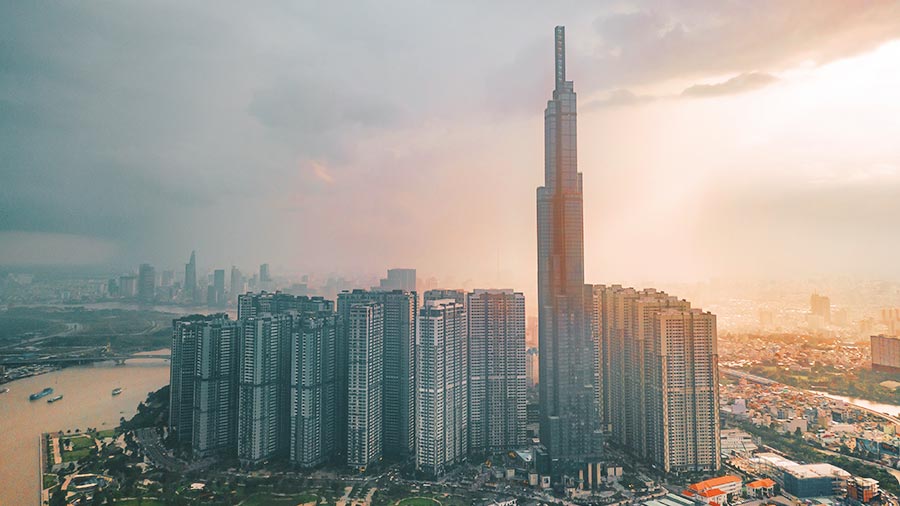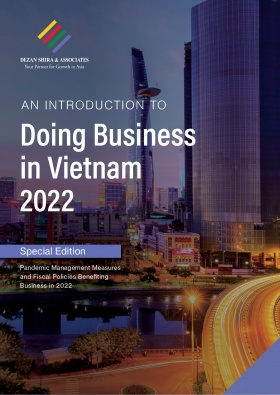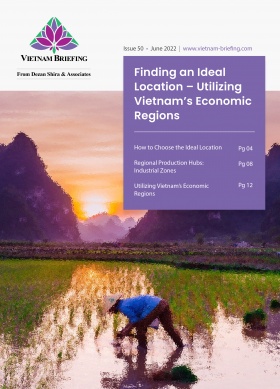Work Permit and Visa Procedures in Vietnam: 2020 Amendments and FAQs
In July 2020, Vietnam made several amendments to the Law on Entry, Exit, Transit, and Residence of Foreigners. It is important that foreigner workers and businesses are aware of these changes.
After restricting foreigners from entering Vietnam due to COVID-19, Vietnam reopened its borders in March 2022, facilitating the arrival of both foreign workers and tourists.
The following month, Vietnam welcomed 89,193 foreigners, up by 104 percent compared to March.
Many of those arrivals were tourists but many were also foreigners entering Vietnam to conduct business or to engage in long term employment.
The latter often come to Vietnam as employees of foreign contractors; working for, or establishing, foreign direct investment (FDI) projects; or to work for Vietnamese companies, providing skills and knowledge missing from the Southeast Asian nation.
These arrivals must follow strict immigration and entry procedures in order to enter and remain in the country.
Vietnam’s visa and work permit procedures can be confusing for first-time visitors. In this article we’ll explain the steps that foreigners should pay attention to when planning to work in Vietnam.
Vietnam’s Immigration Law
Vietnam’s immigration and entry procedures are governed by the Law on Entry, Exit, Transit, and Residence of Foreigners in Vietnam, more commonly known as the ‘Immigration Law’.
This most recent iteration of the law came into force in July 2020 and changed a number of restrictions and requirements for foreigners with regard to accessing Vietnamese visas.
Hiring foreign workers in Vietnam
A Vietnamese entity is permitted to recruit foreign workers in order to work as managers, executive directors, and experts where local hires are not yet able to meet production and business requirements. Vietnamese representative offices are also able to hire staff directly.
To demonstrate the necessity of a foreign employee, 30 days prior to recruiting the foreign employee, the entity must publicly announce recruitment for this position to Vietnamese job seekers in a Vietnamese newspaper or online portal.
Evidence of this announcement must be presented in the application for a work permit for a foreign employee. The other option is to recruit foreigners through a government-owned employment service center.
When hiring foreign staff in Vietnam, there are a number of procedures and processes that must be understood.
Types of work visa
To work in Vietnam and remain for an extended period, foreigners need to apply for a long-term visa. There are a number of options depending on what business or work the visitor intends to engage in.
The most common form of work visa is an LD visa. This is for foreign employees of organizations operating in Vietnam
List of visas for Vietnam
| Visa Code | Description | Validity | |
| DL | Tourist visa | Up to 90 days | |
| EV | Electronic visa, or e-visa | 30 days | |
| HN | Meetings/conferences | Up to 90 days | |
| LD | LD1-2 | Foreign worker/working visa | 2 years |
| LV | LV1-2 | Working with Vietnamese authorities | 12 months |
| LS | Lawyer visa | 5 years | |
| DT | DT1 | Investor visa: issued for investors with total investment capital over US$4.35 million, or for investment into ‘prioritized’ sectors, professions, or geographical areas determined by the government. | 5 years |
| DT2 | Investor visa: issued for investors with total investment capital between US$2.17 million and US$4.35 million, or for investment into ‘encouraged’ sectors, professions, or geographical areas determined by the government. | 5 years | |
| DT3 | Investor visa: issued for investors with total investment capital between US$135,500 and US$2.17 million. | 3 years | |
| DT4 | Investor visa: issued for investors with total investment capital less than US$135,500. | 12 months | |
| DN | DN1-2 | Working with Vietnamese businesses | 12 months |
| NN | NN1-2 | Chief representative office in Vietnam, Head of Project Office of Foreign NGO | 12 months |
| NN3 | NGO staff, Representative Office | 12 months | |
| DH | Student/Internship | 12 months | |
| NG | NG1-4 | Diplomatic visa | 12 months |
| PV | PV1-2 | Press and foreign correspondents | 12 months |
| TT | Dependents of holder of LV1-2, DTI-3, NN1-2, DH, PV1, LD1-2, LS | 12 months | |
| VR | Expatriates visiting their relatives or for other purposes | 6 months | |
Applying for a work permit
A work permit is required to apply for a temporary residence card or a working visa in Vietnam. Under the new Labor Code 2019 that took effect in 2021, work permits are issued for a period of up to two years and restricted to only one renewal.
Note: Foreign workers cannot apply for a work permit for themself. This must be done by their employer in Vietnam.
Getting approval to employ a foreign worker
Organizations that wish to employ a foreign worker, must first seek approval from the Ministry of Labor, Invalids and Social Affairs (MoLISA). Ideally, this should be applied for 15 days in advance of the foreign worker commencing their employment.
Eligibility requirements
To be eligible for a work permit, the applicant must comply with the following conditions:
- Be at least 18 years of age;
- In good enough health to satisfy job requirements;
- A manager, executive director or expert with technical skills and knowledge necessary for the job; and
- Not currently subject to criminal prosecution or any criminal sentence in Vietnam or overseas or have a criminal record.
Processing times
Processing a work permit can take up to 10 business days. However, government offices may ask for additional documents which may increase processing times. Applicants should start the process well ahead of time, ideally three months ahead of work commencement, where practical.
Costs
Costs for a work permit vary depending on the time you intend to stay in Vietnam and the type of visa you apply for. For a full price list see: Vietnam Visa Costs: What You Need to Know in 2022.
Validity
Currently, work permits for foreigners are valid for a maximum of two years and are not renewable. A new application must be made if the company wishes to continue employing the foreign worker for more than two years.
Termination
A work permit may be terminated in the following circumstances:
- Expiration of work permit;
- Termination of labor contract;
- The content of the labor contract is not consistent with the work permit granted;
- If the foreign employee is fired by the foreign employer;
- Withdrawal of work permit by authorized state agencies;
- Termination of operation of the company, organization, and partners in Vietnam; and
- The foreigner is sentenced to prison, dies, or is proclaimed missing by the court.
Work permit exemptions
In certain circumstances, a foreigner may work in Vietnam without a work permit, but they need to apply for a work permit exemption certificate. This certificate is equivalent to a work permit, valid for up to 2 years, and also serves as a basis to apply for a temporary residence card.
A notice must be submitted seven days in advance to the provincial MoLISA prior to working in Vietnam.
As per Article 154 Labor Code No.45/2019/QH14, the following categories are exempt from work permits:
- An owner or capital contributor of a limited liability company with capital contribution value met by the government regulations;
- Chairman of the Board of Directors or a member of the Board of Directors of a joint-stock company with capital contribution value met by government regulations;
- Heads of representative offices, chiefs of project offices, or someone working for a foreign non-government organization in Vietnam;
- Working in Vietnam for less than three months;
- Coming to Vietnam for less than three months in order to resolve an emergency or a technologically complex situation that could affect production, which Vietnamese experts or foreign experts currently in Vietnam are unable to resolve;
- Lawyers granted a professional permit in Vietnam;
- Cases under the provisions of an international treaty to which Vietnam is a signatory;
- Foreigners who marry Vietnamese people and live in the Vietnamese territory; and
- Other specific cases allowed by the government.
Vietnamese authorities are becoming stricter regarding work permits. Those who violate the regulations by working in Vietnam without a work permit may be penalized or, if unable to meet work permit requirements, deported back to their home countries within 15 days. In addition, the employer’s operations may be suspended for three months with a possible penalty of up to US$3,300.
Entering border-gate or coastal economic zones
Foreigners entering border-gate or coastal economic zones, under the decision of the government, may be eligible to enter visa-free. The coastal zone needs to meet the following conditions:
- Having an international airport and a separate space (definite boundaries and separated from the mainland);
- In accordance with the socio-economic development policy; and
- Does not pose a threat to national security, defense, social order, and safety.
This type of visa exemption is valid for 30 days.
Transitioning from one visa to another
Prior to the most recent update of Vietnam’s regulations, foreigners who entered Vietnam on one visa, for example a tourist visa, and then wished to transition to a work visa, would need to leave the country.
This is no longer the case.
In the following situations holders of Vietnamese visas may transition from one visa type to another without leaving the country.
- Investors and representatives of a foreign organization investing in Vietnam;
- Dependents of Vietnamese citizens; and
- Being invited or guaranteed by agencies or organizations, and having a work permit or work permit exemption certificate.
Temporary residence cards (TRC)
A temporary residence card entitles foreigners to enter and exit Vietnam over an extended period (2-5 years).
TRCs for workers
Foreigners who hold work permits valid for one year or more and a work visa, members of management boards of directors, heads of company branches, and Chief Representatives of representative offices of foreign enterprises in Vietnam, can be granted a Temporary Residence Card (TRC).
TRCs for investors
A TRC is issued by the immigration agency under the Ministry of Public Security, and is valid from one to ten years, depending on the visa type. As per the Immigration Law, the duration of each investor visa type of TRC is based on the amount of contributed capital, as follows:
- TRC – DT1 visas: up to 10 years;
- TRC – NG3, LV1-2, LS, DT2 and DH visas: up to 5 years;
- TRC – NN1-2, DT3, and TT visas: up to 3 years; and
- TRC – LD1-2, and PV1 visas: up to 2 years.
Investors using a DT4 visa (with a capital investment of less than VND 3 billion, or US$128,800) are not eligible for a TRC.
Expired TRCs will be considered when granting new cards.
Foreign employees with a TRC can enter and exit Vietnam without a visa within the valid terms of their TRC. The processing time typically takes five working days while the fee varies between US$80 to US$120 depending on the duration of the card.
With a DT1 visa, investors can apply for a temporary residence card initially for two years.
Permanent residence cards (PRC)
An expatriate who has a legal residence while earning a living in Vietnam may also apply for a Permanent Residence Card (PRC); however, they are subject to the following conditions:
- The expat works for the development of Vietnam and is awarded a medal or title by the government;
- The expat resides temporarily in Vietnam for three or more consecutive years and is sponsored by his parent, spouse, or child who is a Vietnamese citizen and has a permanent residence in Vietnam; and
- Foreign scientists or experts recommended by the head of a ministerial or government agency.
The processing time typically takes five working days with a fee of US$100. A PRC holder can stay in Vietnam without a visa; however, a PRC must be re-issued every 10 years.
Other Common Types of Visas for Vietnam
Note: These visas do not entitle the holder to work in Vietnam.
E-visas
In addition to updating its work visa process, Vietnam also updated the processes and procedures for the e-visa system.
Tourist Visas
Tourist visas are granted to individuals who wish to visit Vietnam for leisure purposes. They may be granted for up to 90 days.
Entering Vietnam without a Visa
In order to enter Vietnam, most foreigners need a visa issued by a Vietnamese Embassy or Consulate. A Vietnamese visa can be granted while in a third country or from within Vietnam.
That said, citizens of a number of countries can receive visa free entry to Vietnam. These include:
- ASEAN countries: from 14 to 30 days;
- Chile: 90 days; and
- Federal Republic of Germany, French Republic, Republic of Italy, Kingdom of Spain, United Kingdom of Great Britain and Northern Ireland, Russian Federation, Japan, Republic of Korea, Kingdom of Denmark, Kingdom of Sweden, Kingdom of Norway, Republic of Finland and Republic of Belarus: 45 days
Notes: A gap of at least 30 days in between two visa-free entries was required in a former version of the Immigration Law. This was removed in July, 2020, when the revised Law on Entry, Exit, Transit, and Residence of Foreigners in Vietnam came into effect.
For citizens of countries not listed above, a visa to enter Vietnam will be required.
FAQ - Vietnam work permits
How do I get a work permit in Vietnam?You get a work permit in Vietnam by applying to the Ministry of Labor, Invalids and Social Affairs (MoLISA). Applications must be made by your employer. Individuals cannot apply for work permits themselves.
How do I get a work permit in Vietnam without a degree?
You get a work permit in Vietnam without a degree only in certain circumstances. This will usually involve proving a certain level of expertise in a particular field but is best discussed with your employer.
Can I work in Vietnam on a tourist visa?
You cannot legally work in Vietnam on a tourist visa.
Do you need a visa to work in Vietnam?
Yes, you will need a visa to work in Vietnam in most circumstances. However there are certain circumstances in which you may be exempted. (See: Work permit exemptions).
About Us
Vietnam Briefing is produced by Dezan Shira & Associates. The firm assists foreign investors throughout Asia from offices across the world, including in Hanoi, Ho Chi Minh City, and Da Nang. Readers may write to vietnam@dezshira.com for more support on doing business in Vietnam.
We also maintain offices or have alliance partners assisting foreign investors in Indonesia, India, Singapore, The Philippines, Malaysia, Thailand, Italy, Germany, and the United States, in addition to practices in Bangladesh and Russia.
- Previous Article Produzione in Vietnam: principali criticità nella manodopera e come ottimizzare la gestione delle risorse umane
- Next Article Vietnam’s Tech Startups: Human Resource Challenges































